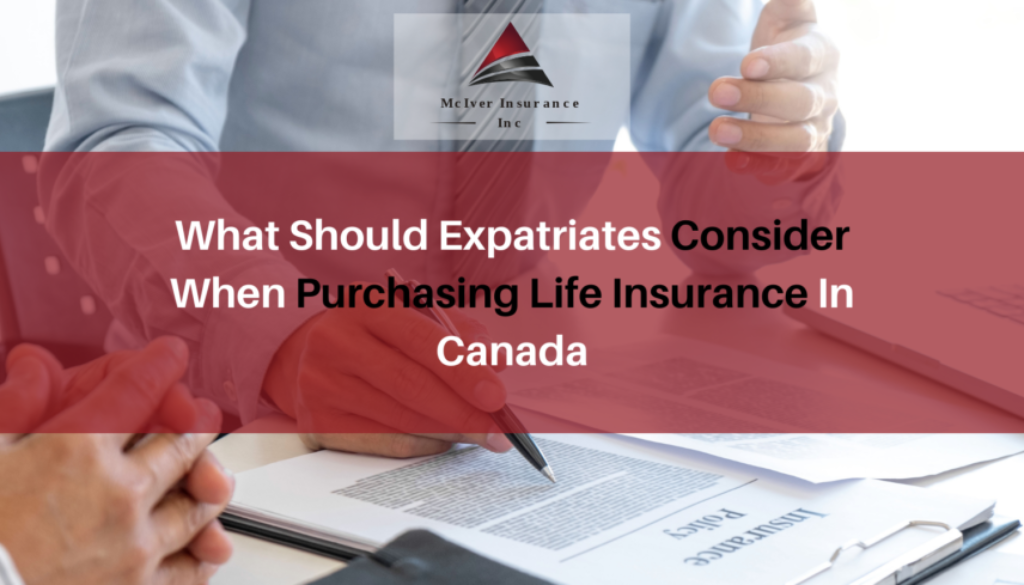What Should Expatriates Consider When Purchasing Life Insurance In Canada
An insurance policy gives a great deal of comfort, as it ensures that your loved ones are provided for in the event of your demise. However, you should not be opting for the first insurance plan that comes your way and, as an expatriate, there are many considerations you should take into account before deciding.
Some of these include your financial circumstances, tax implications (especially for U.S. citizens), medical examinations, and accessibility for beneficiaries. We’ll be discussing all these factors to give you a better idea of the entire framework, allowing you to make an informed decision.
Evaluating Life Insurance Needs for Expatriates
The first step to evaluating what insurance you should purchase in Canada is to evaluate your needs. Everyone’s financial circumstances are different, as are their means of making money, so you need to really sit and carefully consider every aspect.
Some of the factors you should be considering are your income, how much surplus you have at the end of the month, the number of dependents, your current debts, and your overall financial goals.
One example that would help you understand is a person with a well-paying job who has one child, no outstanding debts, an education fund for his child’s university, and a savings account that has enough money to provide a fixed-income for his wife and child and to take care of any emergencies. For such a person it may not be necessary to purchase insurance with a high coverage amount; it could be just enough to pay for the funeral costs.
Conversely, take a person who has a steady job, with multiple children, a mortgage, car payments, credit card debt, and no significant savings. For such a person it might be wiser to purchase an insurance plan that offers a high coverage to cover the costs of the funeral, and, in the long run, basic expenses and education.
You also should consider personal factors as well in your capacity as an expatriate. If the nature of your job is high-risk, then make sure that such risks are specifically covered under your insurance plan. If you’re a retiree, then you should consider whether you would be able to afford insurance coverage or if you’ll find a provider that is willing to provide you coverage considering your age and employment status.
Navigating Tax Implications for U.S. Citizens
The United States imposes significant estate and gift taxes, at a tax rate ranging from 14% to 40%. This is the applicable tax at the federal level and there may also be additional taxes at the state level.
One strategy for bypassing this tax is to set up an irrevocable life insurance trust and make your insurance policy an asset of such a trust. This would allow your beneficiaries to receive their benefits without having to be subject to any taxes.
Another strategy is to ensure that funding and premium payments for any policies are done through corporations. You can see a significant reduction in the applicable tax rate if you choose to use this strategy.
U.S. Tax Compliance and Policy Eligibility
While we have mentioned gift and estate taxes above, for those to apply your insurance policy would need to qualify as a life insurance policy as defined under the United States tax framework.
If not, then the policy would fall under the income tax umbrella, and you would need to pay income tax which would be calculated by taking into account the benefit amount and the cash surrender. In other words, you would be paying taxes on income to which you don’t have access.
Another outcome of non-compliance is an excise tax on premiums, amounting to 1% of the payable premium. As such, there could be associated costs to keeping an insurance policy considering these income and excise tax implications.
To judge if an insurance policy falls under the U.S. tax framework, there are 2 tests. The guideline premium test and the cash value accumulation test.
Unfortunately, these tests require a professional, which will cost a great deal of money, or a certification from the insurer, which can be difficult to obtain. Regardless, you should try to get an insurance policy that has been certified as compliant with U.S. tax requirements or speak to an advisor for further options.
Understanding Medical Examination Requirements
A medical examination is necessary for finalizing an insurance policy, as it allows the insurance provider to assess your overall health and screen for any pre-existing conditions to ensure your eligibility for the insurance plan.
Under the Canadian tax framework, only a licensed healthcare professional who has been appointed by the insurer can carry out the medical examination. The examination will include a physical assessment along with tests and should not take too long to complete.
You might be required to fast or avoid food or certain medications before your examination, so be sure to follow all instructions properly. Failing this, you might be required to go through the examination again or you might compromise your test results which will create problems in finalizing your policy.
Ensuring Your Beneficiaries Have Access
The two biggest challenges for an expatriate and their beneficiaries under an insurance policy are choosing the right beneficiaries and a lack of awareness on the part of the beneficiaries regarding the insurance policy.
When choosing your beneficiaries, ensure that they are financially literate and responsible enough to deal with the large sum of money that is to be obtained from the insurer upon your death. Make sure you give clear written instructions to these beneficiaries on how the money is to be used and have copies of such instructions placed with trusted third parties as well to ensure beneficiaries carry out your instructions.
You also need to keep communicating with your beneficiaries and keep them updated as to where your insurance policy is so they can access it and initiate the proceedings for obtaining the benefits.
Speaking To An Expert
Navigating insurance policies and their tax implications can be a complicated affair and it might be best to speak to an expert. At McIver Insurance you’re sure to find an expert who can advise you in detail on what insurance policy best suits your needs and how best to tackle it from a tax perspective.



